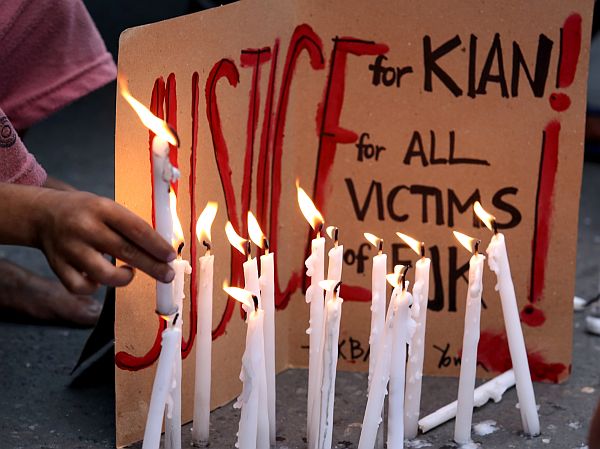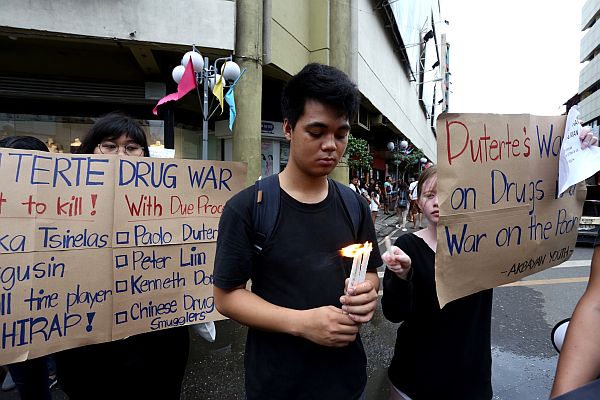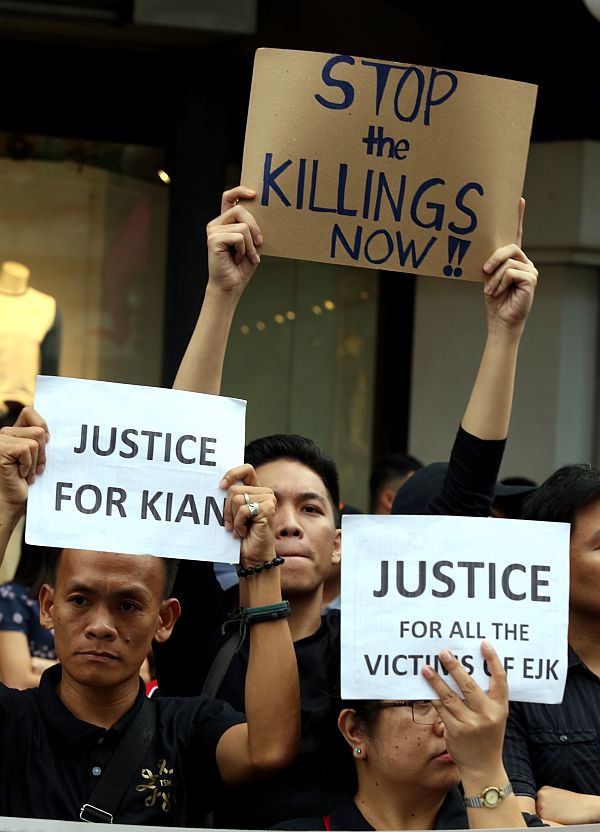The illegal drugs battle runs full speed

Members of the Akbayan Youth light candles as they stage a protest rally at downtown Colon condemning the killing of 17-year-old Kian delos Santos during a police anti-drug operation in Caloocan City, Metro Manila last August 16. Kian’s death fueled public outrage after a security camera showed that he was already in police custody when shot dead contrary to a police report that he had tried to shoot it out with government operatives.
CDN FILE PHOTO
WITH OR WITHOUT BUDGET (Conclusion)
Most of the killings and arrests recorded by the Philippine National Police (PNP) in Central Visayas since July 1, 2016 till 2017 occurred when the police implemented “Oplan Tokhang”, the controversial anti-drug drive in which policemen knocked on the doors of houses of suspected drug personalities, herded them into village centers and town halls and made them promise in writing that they would never again touch illegal drugs.
The operation was temporarily suspended last January 2017 after policemen allegedly involved in an extortion racket kidnapped South Korean businessman Jee Ick-joo, killed him right inside Camp Crame, had his body cremated in a funeral parlor and his ashes flushed down a toilet.
The incident, which drew condemnation from different groups, prompted President Rodrigo Duterte to stop all police units and stations in the country from conducting anti-illegal drug operations.
With the PNP sidelined, the Philippine Drug Enforcement Agency (PDEA) solely took into their hands the government war against drugs.
But barely a month later, President Duterte issued a new order.
This time, for PNP to rejoin the campaign against illegal drugs purportedly because the drug menace resurfaced when the police force was taken out of the anti-drug operations.
Last October 11, 2017, Duterte again stripped the PNP of its role in the drug war following the August killing of 17-year-old Kian Loyd delos Santos by the police.
Kian’s death sparked public outrage after a security camera showed the victim in custody, contrary to a police report that he was a drug dealer who tried to shoot them.
However, after two months, the country’s top executive again called the police back to his war on drugs, saying there was a “notable resurgence in illegal drugs” when policemen took a step back in the campaign.

Protests over the death of 17-year-old Kian delos Santos and many others during police anti-drug operations prompted President Rodrigo Duterte to issue an order, at least twice, for the Philippine National Police (PNP) to stop operating against illegal drugs. The orders have since been taken back by Duterte citing a “notable resurgence” in illegal drugs when the PNP took a step back in the anti-drug campaign.
CDN FILE PHOTO
Now that the police is back in the government war on drugs, the director of the Police Regional Office in Central Visayas (PRO-7) Chief Supt. Jose Mario Espino, said that they will do everything they can to put an end to the narcotics trade in the country.
“There will not be a let-up in this campaign against illegal drugs. We are monitoring those involved in the illegal drugs trade,” said Espino.
“If they continue their illegal operations, they will really be subjected to operations,” he added.
Espino said that their motivation to get the job done comes from knowing that President Duterte supports the police.
“We attribute our successes to the strong political will of our President,” said the region’s top police official.
For his part, Senior Supt. Joel Doria, director of the Cebu City Police Office (CCPO), said that even when they were barred from conducting anti-drug operations, the police continued to gather intelligence information on the illegal drug trade and relayed them to PDEA.
According to Doria, policemen will always find ways to contribute to ending criminality, particularly the illegal drug trade, no matter what circumstances they are in.
“Whether there is a budget or not, we will do what we can to help. Our policemen are hardworking,” he said referring to a P900-million fund for anti-drug operations originally intended for the PNP but realigned by the Senate when Duterte issued his order for police to stop operating against illegal drugs.

Protests over the death of 17-year-old Kian delos Santos and many others during police anti-drug operations prompted President Rodrigo Duterte to issue an order, at least twice, for the Philippine National Police (PNP) to stop operating against illegal drugs. The orders have since been taken back by Duterte citing a “notable resurgence” in illegal drugs when the PNP took a step back in the anti-drug campaign.
CDN FILE PHOTO
Doria said the allocation which the Senate had yet to reinstate into the PNP’s 2018 budget can be used to buy surveillance equipment and pay for other operational expenses.
“Of course, we need a budget because it’s definitely hard to move without the resources,” he told Cebu Daily News.
Under the Senate’s 2018 budget, the PNP will get P131.628 billion next year which is P20 billion more than its P111.6 billion budget in 2017.
The budget does not include the P900 million which was realigned by legislators last November for housing military troops and police officers.
But aside from government funds, Doria said they also rely on donations from private individuals.
Just recently, a private company donated six body cameras to the Cebu City police force.
The donation came after PNP chief Director General Ronald “Bato” Dela Rosa ordered the mandatory use of body cameras for policemen conducting anti-drug operations.
Dela Rosa’s move was meant to ensure that no human rights violations are committed by cops during raids.
“Hopefully, there will be more good Samaritans who are willing to help the police. May they help us in this endeavor,” said Doria.
Disclaimer: The comments uploaded on this site do not necessarily represent or reflect the views of management and owner of Cebudailynews. We reserve the right to exclude comments that we deem to be inconsistent with our editorial standards.
